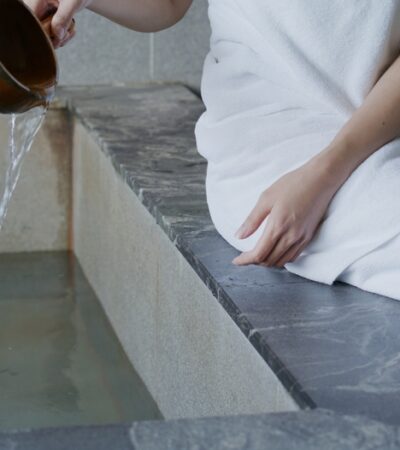Philippa Maples discovers how to get rid of the unwanted tummy tyre…
The ‘London Belt’ refers to that spot of your stomach between your navel and hipbones; you know the spot I am talking about. It is the reason most of us exercise regularly and why we watch what we eat. It is almost as if this non-budging piece of stomach fat has decided to stay put forever.
The ‘London Belt’ can be attributed to long working hours, lack of sleep and constant stressors both in terms of external factors, such as relationship and job stress, bereavement, financial issues and diets heavily loaded with stimulants like coffee, refined sugar and alcohol. Today’s city life requires a fast paced lifestyle to function, we are all guilty of skipping the odd meal because of the ever increasing pile of work or the diary filling with dinner dates, meetings and social events that you just ‘have to be there for’.
Swedish Personal Trainer Robine Fagerberg explains, “Unfortunately in today’s city lifestyle it’s all about ‘quick and easy’, we forget how much hard work it takes to have the body that we desire. We live in such a stressful environment and sometimes we feel that we don’t have time so we get tired and from there it’s a downward spiral”.
UK Nutritionist Zoe Stirling further explains, “This downward spiral causes the body to be in a constant state of ‘fight or flight’ mode this is our body’s natural response to stress. This increases the release of certain hormones, namely adrenaline and cortisol”. In the prehistoric times of our ancestors ‘fight or flight’ mode would occur only in short bursts, usually when escaping from predators. “This raises blood sugar levels in the body and today with so many of us sitting behind our desks our bodies don’t really need to use this sugar. Sugar that is not used therefore converts to fat and commonly gets laid around the abdomen area as it is closest to the liver, where is can be quickly converted back to sugar when necessary” says Zoe. This is the basis for our ‘London Belt’ problem.
Integrative Physician Dr. Jade Teta explains, ‘To lose fat you need both the right amount of calories for your body type and a hormonal balance, to lose that last hold on stubborn lower belly fat you need to understand the hormones involved. In women these hormones are: insulin, cortisol (associated with stress), estrogen, progesterone, testosterone and of course the major fat burning hormones, the catecholamines (adrenaline and non-adrenaline) these are released during intense exercise and have a strong fat burning impact on visceral belly fat (deep stomach fat), and a weaker fat burning impact on subcutaneous fat (lower belly fat). This is the fat that you can pinch and is less sensitive to the major fat burning hormones, therefore our ‘London Belt’ is more likely to be subcutaneous fat.
The greatest impact on the hormone insulin is excess calories mainly starch and sugar. Foods that combine fat and sugar have the greatest number of calories and the most negative impact on fat storing hormones. When stress is added on top of this your cortisol is added to insulin, a bad hormone combination for belly fat. When stress becomes chronic or extreme in females, the command and control center of your hormones (the hypothalamus & pituitary) becomes “irritated” and you get the downstream effects on your thyroid, adrenal, and ovarian hormone production. Chronic stress in women leads to increased testosterone and lower estrogen and progesterone.
Robine further explains, “I have had clients that exercise their butt off and they complain they still are holding onto that small ‘belt’ just under their belly button. I always say the same thing to them, ‘If you can teach yourself a few simple steps at a time to change your way of life it can make a huge difference’. Start by being honest with yourself and look at how you live your life, look at what you eat and drink and how regularly you exercise, once you do that and start changing these few things you are immediately on the right track to reaching your ultimate goal. It is all about priorities, after my clients adapt these simple steps to their lifestyle they can see the big difference it makes to their body.”
Dr Jade Teta believes supplements can also help with our stress levels, “there are a few supplements that have been shown to help the hypothalamus/pituitary control center resist stress. These include Curcumin, found in the spice turmeric or as an individual supplement, through studies it has shown to elevate mood and protect against sleep deprivation. Fish Oil or Krill Oil are also great for improving brain function through its high content of Omega-3’s and Rhodiola Rosia, a natural vitamin that is proven to treat fatigue, stress and improves physical and mental performance.
“Balancing blood sugar levels is also the key, by cutting out all refined sugars and carbohydrates, eating low glycaemic index (GI) foods along with healthy sources of lean protein little and often is an effective way of doing this. Try to consume wholemeal and wholegrain versions of foods and plenty of non-root vegetables, especially dark green leafy vegetables such as spinach, watercress, cabbage, cavalo nero, and broccoli which are high in various vitamins and minerals” says Nutritionist, Zoe Stirling.
When one begins dealing with stress, tiredness and their lifestyle, common ground can be found with you and your body. It’s all about bringing the balance back.
Image: Clothes from Lorna Jane; Determined Tank $34.99, Tia Core Compression 7,8 Tight $89.99, MNB Bracelet, Good Vibes Exercise Mat $59.99, Misha Mesh Tank $59.99, Lorna’s Fave Track Pant $89.99, MNB Bracelet













